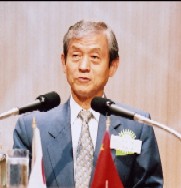��Birth of Sarkozy Administration
-Start for France��
June 6, 2007
Mr. Hiroshi
Hirabayashi
Councilor,
The Japan Forum on International Relations, Inc.
Former Ambassador to France
 ��France was once at the center of European history. After WWII, France was a prominent power both in Europe and in the world. However, in recent years when the Cold War ended and the world embarked upon globalization, not only did the EU expand, but all of Europe was incorporated into the structure of the world economy. Therefore, the relative position of France declined.
��France was once at the center of European history. After WWII, France was a prominent power both in Europe and in the world. However, in recent years when the Cold War ended and the world embarked upon globalization, not only did the EU expand, but all of Europe was incorporated into the structure of the world economy. Therefore, the relative position of France declined.
��Up until now, the French people appeared to have been quite content with the status quo. France, up to now had been a welfare-society type of country, and the French people desired a big government that was able to provide as many services as possible and past governments had worked in that direction.
��However, the world is heading to a market -driven economy where the state does not manage the economy, but leaves it up to the market forces even in Europe. It is a liberal-oriented economy. The Blair administration in the UK is in power based on the Labour Party, but in terms of its economic policy it is clearly leaning to the right. The same can be said of Prime Minister Jose Luis Rodriguez Zapatero of Spain. Even Federal Chancellor Gerhard Friz Kurt Schroeder of Germany extended the working hours. Amidst these changes, the French actions were often extremely lagging other countries.
��Thinking French people, whether they be politicians or bureaucrats or economic leaders are all attempting to change the welfare-society type of country. However, there is strong opposition. The primary opposition power is the labor unions, consisting of 4 or 5 national unions. The second opposition power is the national public servants whose number is quadruple that of Japan.
��It is said that in France that there are 1 or 2 public servants in any family or among relatives. These people have the power to work for keeping the status quo and as an opposition force. The Socialist Party and other left-wing parties are also oriented toward a welfare-society-type of country.
��Not only in economic policy, immigration has also been growing in France as well as in other European countries. In particular, there are many illegal immigrants. It is safe to say that eliminating illegal immigration is the root of what ails Europe today.
��President of France Nicolas Paul Stephane Sarkozy��s reform-oriented campaign phrase was ��parting and change��. Sarkozy by his own reckoning and that of others is action-oriented. He is a person who delivers on promises and a person of immediate decision and action. He is rich in ideas and is a top-down type of leader. He will always try to execute the ideas that he proposes.
��In my mind, what France needs now is a leader that will part with the past and destroy it to a certain extent and make a new start, thus, I think that the victory of Sarkozy in the presidential election was truly good for the country.
��It would appear that reforms will come at a rather quick pace. There will be elections for the members of the National Assembly on the 10th and the 17th. Sarkozy is a traditional conservative. The current National Assembly is strongly dominated by a party that calls itself the Union for Popular Movement. In the coming election of the National Assembly, Sarkozy��s ruling party is forecasted to strengthen its power even more than presently.
��President Sarkozy reduced the number of cabinet members from 30 to 15 and appointed a member from the Socialist Party, 1 from the middle-of-the-road and appointed a female executive who was a nonpolitician concurrently as the Minister of Culture and Communication and spokesperson. In essence, it is a federation of the people. Its posture is to overcome the dark side of France.
��I think that relationship between Japan and France will strengthen with shared concerns for reform of the United Nations Security Council, emphasis on the environment, nonproliferation of nuclear weapons, and the like.